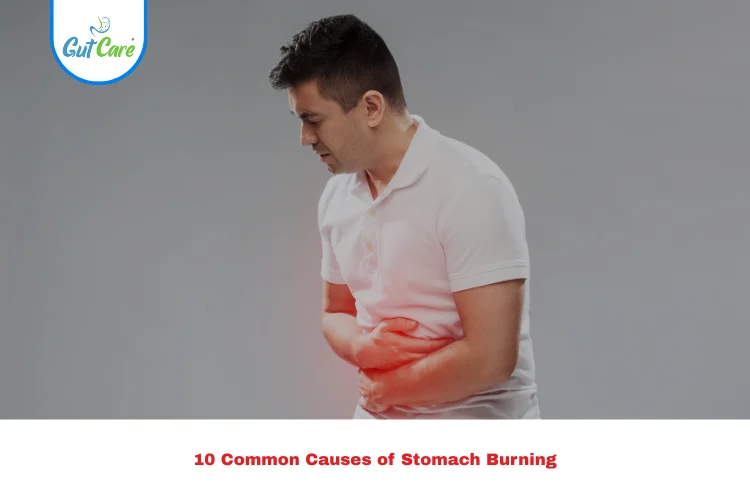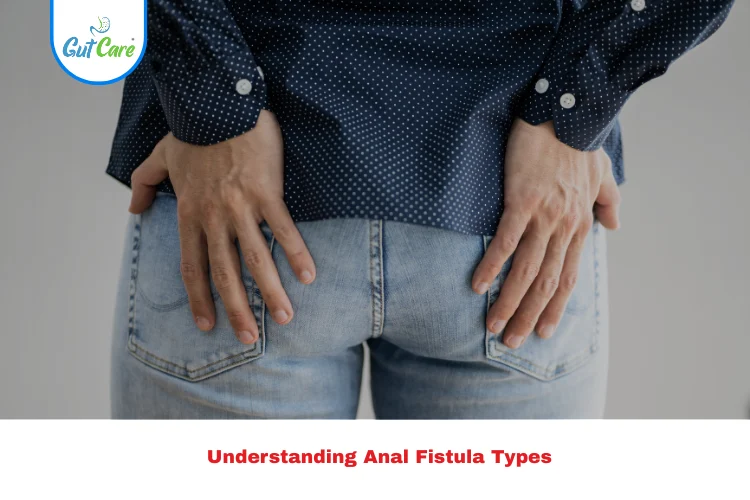That sharp, or nagging burning in the stomach that most of us have experienced at one point or the other. For many, it occurs occasionally after indulging in a large meal or eating a particularly spicy meal. For others, it occurs regularly, often interfering with daily life. Although it’s easy to either ignore, or call it a “really bad case of indigestion” – there could be a real reason for stomach burning, one that may deserve your attention.
At Gutcare Clinics, Bangalore, seasoned specialists like Dr. Yuvrajsingh Gehlot will often meet with patients that have delayed help but sought assistance once the discomfort becomes unbearable. Knowing the different stomach burning reasons will help you to act early, and avoid complications. Below we examine the top burning causes, and what you can do.
1. Acid Reflux (GERD)
This is the most common reason for stomach burning. Acid reflux occurs when the muscle at the base of the food pipe (the lower esophageal sphincter) doesn’t close properly. As a result, stomach acid travels upward, causing heartburn in the chest and burning in the stomach.
Who’s at risk? People who eat large meals late at night, are overweight, smoke, or consume a lot of caffeine or alcohol.
Everyday example: Ever felt a fiery sensation after a midnight pizza? That’s classic reflux.
What helps:
- Eat smaller meals more frequently.
- Avoid lying down within two hours of eating.
- Elevate your head slightly while sleeping.
If symptoms persist for weeks, consult a gastroenterology specialist like Dr. Yuvrajsingh Gehlot.
2. Gastritis
Gastritis refers to inflammation of the stomach lining, usually due to infection (most often due to H. pylori bacteria), stress, and/or drinking too much alcohol. Painkillers such as ibuprofen also irritate the stomach lining.
Symptoms: In addition to burning pain in the stomach area that occurs after eating, you may have fullness, bloating or nausea for example may not be able to eat as much as normal.
Practical suggestions:
- Eat bland, easy-to-digest meals!
- Avoid alcohol and acidic foods!
- Do not use painkillers too much!
Professional help is usually needed if you have chronic gastritis because it can turn into ulcers.
3. Peptic Ulcers
Ulcers are painful, open sores in the stomach lining or the small intestine. Ulcers are a serious reason for burning in the stomach because they can cause bleeding or even perforation if ignored.
Risk factors: H. pylori, overuse of NSAIDs, smoking.
Symptoms: Sharp pain often between meals, pain at night, or an improvement after eating but with pain a few hours later.
When to take action: You should always seek guidance from a gastroenterology clinic such as Gutcare Clinics in Bangalore if you have prolonged stomach pain.
4. Indigestion (Dyspepsia)
Not every burning in the stomach means something severe—it could simply be indigestion. This happens when the stomach struggles to process a large or greasy meal.
Triggers: Eating too fast, overeating, or having very rich foods.
Quick relief ideas:
- Sip on cold milk or a glass of water.
- Chew fennel or cumin seeds.
- Take a short walk after meals.
If you’re wondering how to stop stomach burning immediately, these are safe first steps.
5. Food Intolerance
Sometimes the problem isn’t your stomach—it’s the food. People with lactose intolerance, gluten sensitivity, or spice intolerance often report stomach burning after eating their trigger foods.
Example: A person with lactose intolerance may feel fine until they drink a milkshake, which then leads to bloating and burning discomfort.
Best approach: Maintain a food diary. Identifying and avoiding your triggers is the most effective remedy.
6. Alcohol and Caffeine Overuse
Alcohol and caffeine stimulate acid production and irritate the stomach lining. A cup of coffee on an empty stomach or regular weekend drinking can easily cause burning in the stomach.
Solutions:
- Limit alcohol to social occasions.
- Switch to green tea or herbal teas.
- Always eat something before coffee.
These simple lifestyle changes are powerful stomach burning remedies.
7. Gallstones
Pain from gallstones typically radiates to the stomach area, resulting in a burning sensation similar to what some may feel after eating fatty foods. Pain may also radiate to your back or right shoulder blade.
Diagnosis: The only way to be sure of gallstones is to have an ultrasound or a scan.
Advice: Go to a trusted clinic, like Gutcare Clinics, Bangalore, for accurate diagnosis and appropriate treatments.
8. Stress and Anxiety
Your mind is closely connected to your stomach. Stress induces an increase in stomach acid and affects gut motility, which can account for why anxious people often report burning in the stomach even if they haven’t eaten.
How to manage:
- Exercise yoga, meditation or deep breathing.
- Take breaks at work.
- Keep moving – try to walk regularly.
9. Infections (H. pylori)
This bacterial infection is one of the most ignored reasons for stomach burning. Left untreated, it may spread to ulcers, and in rare cases, stomach cancer.
How you catch it: Often consuming contaminated food/water.
When do you test: If burning is persistent and remedial treatments are not helping, your doctor will suggest a breath or stool test to check if you have H. pylori.
10. Medications
Some medications, especially painkillers, antibiotics, and iron supplements, can irritate the stomach lining. Long-term use often leads to continuous burning in the stomach.
Safe practices:
- Always take medications with food.
- Ask your doctor about alternatives if discomfort continues.
- Never self-prescribe strong drugs.
When to See a Specialist
For mild symptoms, you may be able to use basic stomach burning treatments or remedies at home. There are times that you should go under medical supervision, depending upon the severity of pain, if you have unexplained weight loss, vomiting blood or black stools.
Dr. Yuvrajsingh Gehlot at Gutcare Clinics in Bangalore evaluates and treats digestive disorders. Early consultation leads to quicker recovery and prevents dangerous complications.
FAQs
1. What causes stomach burning most often?
Stomach burning is most commonly caused by acid reflux (GERD) due to stomach acid from the stomach coming back up into the food pipe.
2. How can I stop stomach burning right now?
If you asked how to stop stomach burning right now, you might try drinking some cold milk, chewing some fennel seeds, or sipping some aloe vera juice. These produce a quick but temporary relief.
3. What’s the cause of stomach burning after eating?
Stomach burning after eating can occur for a variety of reasons, which may include acid reflux, fullness and indigestion, or food intolerances like dairy or gluten sensitivity.
4. Is there anything that works for stomach burning naturally?
Yes, things that can work for stomach burning naturally include ginger tea, aloe vera juice, fennel seeds, and avoiding heavy or spicy foods.
5. Should I visit Gutcare Clinics in Bangalore for persistent stomach burning?
Absolutely. Persistent symptoms mean you should consult a specialist like Dr. Yuvrajsingh Gehlot at Gutcare Clinics, Bangalore, for accurate diagnosis and treatment.




